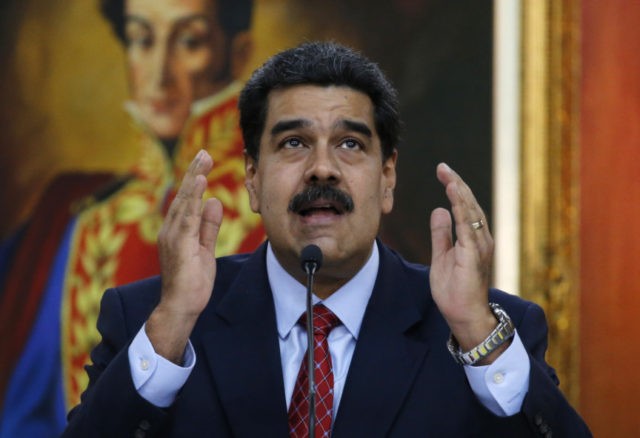Deposed Venezuelan dictator Nicolás Maduro condemned the United States Monday night for imposing a new round of sanctions on Petróleos de Venezuela (PDVSA), the state oil company.
The move is intended to get Maduro to move out of the presidential palace and allow constitutional interim president Juan Guaidó to take charge.
Guaidó, the head of the federal legislature, took an oath of office and became president last week at a rally, invoking Articles 333 and 350 of the Venezuelan constitution, which require the Venezuelan people to stop recognizing a head of state if they violate human rights or disrupt the democratic order.
Maduro called Guaidó’s swearing-in “unconstitutional” and has refused to step down, citing the backing of the nation’s military leaders. Dozens of countries around the world have recognized Guaidó as the rightful president and refused to engage in diplomacy with Maduro, including the United States.
Presidente de Venezuela @NicolasMaduro, denunció que el gobierno de @realDonaldTrump "decide transitar por el camino ilegal para robar la empresa Citgo a Venezuela" tras las sanciones de #EEUU a @PDVSA pic.twitter.com/ulkH0fIDlw
— teleSUR TV (@teleSURtv) January 29, 2019
In an extended diatribe broadcast through state media, Maduro decried the sanctions against PDVSA as “unilateral, illegal, at the margins of the U.N. Security Council.” He accused President Donald Trump of plotting “to steal our riches … and later on our territory,” listing the Essequibo, a Guyanese territory that takes up two-thirds of the territory of that country, as rightful Venezuelan land.
“The United States has begun transiting on the path of robbing us of the Citgo enterprise,” Maduro alleged, referring to the U.S. refining branch of PDVSA. Maduro’s regime currently uses Citgo to refine PDVSA’s heavy crude and sell it to the United States, generating funding that allows for Maduro’s lavish lifestyle and for purchasing the military equipment necessary to continue killing and repressing pro-democracy dissidents. The new sanctions ban all U.S.-based companies from paying PDVSA money, depriving Maduro of access to the Citgo profits.
Announcing the sanctions on Monday, National Security Advisor John Bolton argued that they were necessary to prevent the enrichment of the Maduro regime through public funds that should legally be managed by Guaidó and his presidential team.
“The path to sanctions relief for PDVSA is through the expeditious transfer of control to the Interim President or a subsequent, democratically elected government,” Bolton explained, adding that “stability and democracy in Venezuela are in the direct national interest of the United States.”
The U.S. government has meticulously avoided sanctions on Venezuela’s oil industry, the country’s largest, in the past. The closest the Department of the Treasury has gotten to sanctioning PDVSA is blocking Americans and corporations from purchasing PDVSA debt in August 2017, debt that Maduro used to generate revenue for his military. At the time, the Treasury Department expressed concern that full sanctions could harm the Venezuelan people directly and announced it would offer waivers for individual transactions that the debt sanctions prohibited if considered necessary.
PDVSA, despite boasting access to Venezuela’s vast oil reserves, has seen its value collapse under the Maduro dictatorship as longtime industry experts fled the company or lost their jobs, replaced by Maduro loyalists with no experience in the oil industry. The same occurred prior to Maduro, under Hugo Chávez, but oil prices were high enough to mitigate losses. Between the drop in oil prices and the Chávez-Maduro policy of sending free oil to allied states like Cuba, by November experts described PDVSA as being in “freefall,” producing less than one million barrels of crude oil a day.
A month later, a Reuters report citing internal PDVSA documents found that Venezuela was now forced to import 300,000 barrels of oil a day despite being home to the world’s largest known oil reserves. Much of those imports go to China and Russia, to which Maduro’s regime is heavily indebted.
It is not yet clear what happens to those debts if Guaidó succeeds in establishing himself as president. The U.S. State Department announced Tuesday it is working to help Guaidó gain access to Venezuelan government accounts now that Washington does not recognize Maduro has head of state, potentially helping this reality to develop sooner.
“Secretary of State Michael R. Pompeo certified the authority of Venezuela’s interim President Juan Guaidó to receive and control certain property in accounts of the Government of Venezuela or Central Bank of Venezuela held by the Federal Reserve Bank of New York or any other U.S. insured banks,” deputy State Department spokesman Robert Palladino said in a statement.
The State Department also recognized Venezuelan diplomats appointed by Guaidó as legitimate representatives of that country over those installed by Maduro.

COMMENTS
Please let us know if you're having issues with commenting.